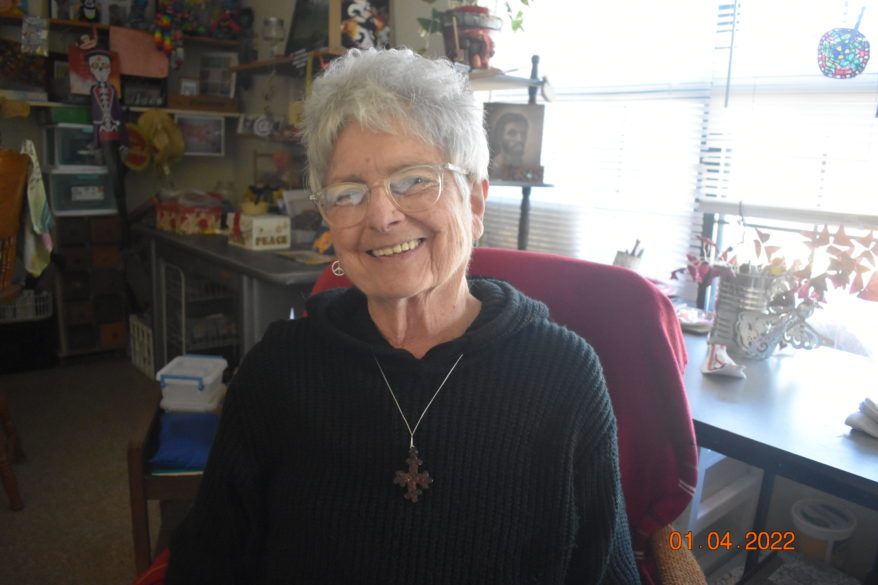From the hermitage
By sister alies therese
Lent can be a curious time, full of darkness or foreboding, scary or convicting. Other times we experience the coming of spring, the hopefulness of a world reborn, and of our own selves drawn out and creating anew.
I love the wisdom literature our canon has retained. The Book of Wisdom is clocked back to 100 BCE and though the actual author is unknown, he was likely a member of the Jewish community at Alexandria in Egypt. It is said that he “places his teachings on the lips of the wise king [Solomon] of Hebrew tradition in order to emphasize their value.” (Intro, page 729, Book of Wisdom, NAB, 1970) The author would be considered learned among the sages of post-exilic Judaism.

At the end of the Book of Sirach (132 BCE) we find the call to discover wisdom by prayer, persistent study, instruction, purification from sin, enlightenment and ardent desire. In 51:23-26 the author notes that “wisdom gives herself to those who seek her and for their labor God will reward them at the end.”
We also discover this: “How long will you be deprived of wisdom’s food; how long will you endure such bitter thirst? For she is close to those who seek her, and the one in earnest finds her … let your spirits rejoice in the mercy of God and not be ashamed to give God praise.” (Sirach 51:24, 26, 29)
The author of this book is likely who he says he is, Yeshua ben Eleazar ben Sira. This is one of the longest books in the Bible and ‘contains the most extensive portion of Israelite wisdom literature.’ (NJBC, page 496)
Further back in 300 BCE the Book of Ecclesiastes introduces the notion of the vanity of all things and asks questions about the purpose of life … has it any value?
“Merit does not yield happiness, for it is often tried by suffering. Riches and pleasures do not avail. Existence is monotonous, enjoyment fleeting and vain; darkness quickly follows. Life, then is an enigma beyond human ability to solve.” (Intro, page 711, the Book of Eccl, NAB). Qoheleth (Greek for the Hebrew Ecclesiastes) was a pen name for the author some thought might be Solomon. Again, to give great dignity and authority to the text. Thought to be a native of Jerusalem he studied the law, prophets and writings and became a teacher.
His text is a series of questions and not mandates, for he had studied and also experienced life and found they do not always jive. For example, he notices that the same things seem to happen to the wise and to the foolish, the faithful and the deceived. So, what’s the profit? They both die. Yet he sees something of the timelessness of all things and his poem with which you might be familiar … in chapter 3:1-8 “for everything thing there is a season …” is beautiful. Later in his text he poses this: “no one knows the future … who can tell what will come after?” (9:1-11:6)
I love studying these three books. They address basic human questions about life, death, knowledge, love and wisdom. Other challenges about life … am I just a waste of space? Can I do anything I want? Where do I learn (and how) to live and how to love? How am I deceived? Lent is a perfect time to explore something new, to enhance our relationship with our Creator, and to offer to others our treasure so they might grow as well.
Wisdom literature reads beautifully in so many places, poetic, flowing and drawing one into the graciousness of God’s heart. What does God want for us? I suspect some of Jesus’ formation as a boy and youth came from these invitations in Wisdom. You will be familiar with the little chapter on suffering in Wisdom 3:1-12 as central to our funeral celebration.
In the New Jerome Biblical Commentary, I found this:
“The first half of the book is divided … the Book of Eschatology, dealing with the problems of retribution for good and evil and the immortality Wisdom offers. The second describes Wisdom and her operations in the world and explains how she is to be found … the exhortation to justice, which the rest of the book will reinforce: live a virtuous life, and trust in God because these qualities make possible union with God and with Wisdom.” (page 513, Commentary NJBC)
As Lent progresses discover whether and how you apply the practical deeds of wisdom in your life:
“Her I loved and sought from my youth; she adds to nobility the splendor of companionship with God; even the Lord loved her … if one loves justice the fruits of her works are virtues; for she teaches moderation and prudence, justice and fortitude, and nothing in life is more useful for us than these. So I determined to take her to live with me, knowing she would be my counselor while all was well, and my comfort in care and grief.” (Wisdom 8:2-3, 7, 9)
Easter Blessings.
(Sister alies therese is a canonically vowed hermit with days formed around prayer and writing.)
